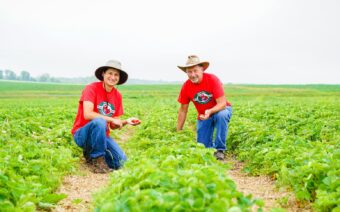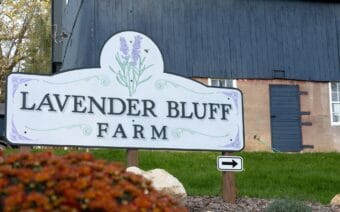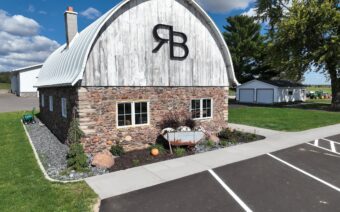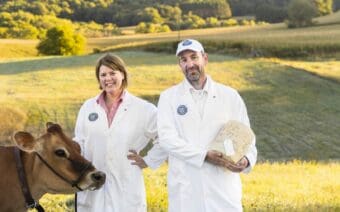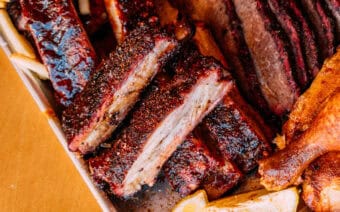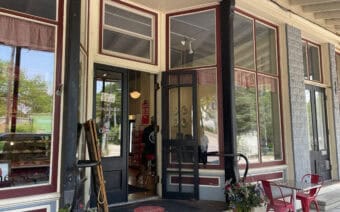
March 18, 2024
TILDEN – Amanda Bohl said she has always loved farming and poultry – starting to raise chickens of her own when she was 12 or 13 years old.
After she got married and started having children, this now mother of five said she wanted to raise chickens on a larger scale and do it professionally.
“There’s not a lot of poultry infrastructure here in northwestern Wisconsin, so I thought it was a good business idea,” she said. “But I also wanted to stay at home with my family instead of working outside the home – and I wanted the flexibility of working for myself.”
In 2009, Amanda’s Eggs and Pasture Poultry LLC made its debut with 36 hens, selling eggs to neighbors and local community members.
By about 2013, Bohl said she had some 2,000 hens and expanded her operation to wholesale – marketing to meat markets, local food coops, grocers, restaurants, cafes and kitchens.
“I got my first hens from a neighbor,” she said. “And 36 quickly turned into 100, then 800 and then a couple thousand. Now, I have about 2,500 laying hens, and the flock basically stays at that number all the time.”
Situated on a five-acre parcel of farmland she currently rents, Bohl said there were some existing dairy barns there that she retrofitted to accommodate the growth of her flock – making room as her hen population grew.
“I had some existing dairy barns, so I retrofitted those, as needed, to accommodate the growth of the flock,” she said. “Like I said, poultry infrastructure in these parts is non-existent, and, as of yet, I haven’t put up a commercial building. I’m still small to middle agriculture at this point.”
Diversification was key
Selling wholesale, Bohl said, allows her to not have to rely on a distributor or marketer “who was going to take most of my profit away.”
“Being able to stay at home with my family, work from home and be a part of the local food economy by directly marketing my product and cutting out the middle-man, or middle-men, if you will, were the reasons for my starting the business and running it the way I am,” she said.
Though she may consider doing a commercial set-up at some point down the road, one decision Bohl said she made from the start was to diversify the business – that way she could be assured of always having money coming in to support her family.
“So, when the market dips or eggs aren’t selling so good, we have some of these other things that would happen, and we’d still have income streams coming from other products,” she said.
Besides the hens, Bohl said she has a fairly large flock of ducks (about 200) whose eggs she also sells, along with a small flock of geese.
“We got them because the neighbor didn’t know what to do with them,” she said. “So I took them. And we usually have about 100 turkeys every year as a seasonal thing.”
Over the years, Bohl said she has become somewhat of a poultry jockey, if you will.
“People bring me chickens they can’t keep or don’t know what to do with,” she said. “We do three things here – it’s also a diversification of things. We have hens that lay brown eggs that can also be colored (for Easter), by the way, just like white eggs can. Then I also raise anywhere from 1,500-2,000 colored birds, though one year it was about 6,000. They are Special Blacks Heritage Breed birds I raise for live sale.”
Bohl said she also has 1,500-2,000 broilers on the pasture yearly.
“We direct market those poultry products,” she said. “We’re starting with broilers now – the first batch will be here in mid-to-late March – and we’ll do another batch in the fall. But we try not to have them in the cold months – like from Christmas to April.”
For those who don’t know, Bohl said, broilers are meat birds.
“They’re heavy white birds that finish (growing) in eight to 10 weeks,” she said. “They are the commercial meat birds and are like the same chickens you’d find in the grocery store. Cornish Cross is another name they call them. And those broilers all go through inspected processing– we use a processing plant in Greenwood, called Greenwood Meadows.”
An overabundance of regulation, combined with other bureaucracy and red tape, Bohl said, has led to a shortage of poultry or egg processing plants in Wisconsin – which can sometimes cause issues.
“A lot of our eggs go on a truck – they’re shipped down to southern Minnesota and southern Wisconsin, as well as Illinois and Iowa,” she said. “They get packaged by large companies and are then shipped back up here to be distributed.”
With that, Bohl said, comes huge transportation costs.
“The limitations state statutes put on local food producers, or any food producer or farmer, when it comes to marketing their product creates a huge bottleneck,” she said. “That’s why, I think, a lot of people have to rely on these big distributing companies to market their product for them.”
Bohl said there is potential for a stronger local food economy, but there are lots of steps, challenges and bureaucracy associated with doing that.
“I’ve been able to help other small farmers market their eggs,” she said. “So, when I expand and start doing my own processing, I would also like to be a distributor, as well as being an egg producer, and help other small- and middle-agriculture egg producers market their product, as well.”
Bohl said she also hopes she can help other small- to mid-level agriculture egg producers avoid some of the legal pitfalls she encountered when first starting.
“I ran into a lot of dead-ends, but it shouldn’t be this hard,” she said. “(Many of us) produce a high-quality product, and it shouldn’t be this hard to sell it or to offer it to the public.”
Despite the hurdles she’s encountered over the years, Bohl said she’s never let it stop her or slow her down.
“I always either deal with those issues head-on, or I go around it and keep going,” she said.
A little help from her kids, friends
One would think this size of operation would require a staff of several people – but, they would be wrong.
Bohl said she has a little bit of local help, as well as the help of her older kids – her kids are Clare, 16; Margaret, 14; Emery, 12; Anna, 10; and Isaac, who will be 2 in April.
She said she also has a couple of neighbor kids who help her, one who helps make weekly deliveries to a tri-county area and has been a huge part of the farm’s success.
Bohl said she has mentored dozens of kids over the years – where they have gained knowledge about farm life and operations, as well as a strong work ethic.
“Our kids go to a small school, and the families there value their kids having a summer job,” she said. “So, we’ve mentored many kids throughout the years.”
Bohl said one girl, named Maria, who worked on the farm for about a year approximately four years ago, recently had to write an essay about someone who inspired her, as part of a college entrance package.
Maria wrote about Bohl.
“Amanda is also full of a fiery passion that is contagious,” Maria wrote in her essay. “She puts her whole spirit into what she believes and values. When she worked, she used all the strength she had. I often would get tired, but Amanda would quickly prompt me to continue. We worked until a job was done. This taught me the importance of seeing a job through and how a good work ethic serves you well. When I think of courage and ambition, she is still the first person who comes to mind. Her example of making her farm a reality is an encouragement to me to keep going after what I want in life.”
Bohl said it’s hard for her to imagine she made that kind of impact on Maria’s life, but she was extremely moved by the essay.
On the horizon
As a single mom and the sole provider for her family, Bohl said what Amanda’s Eggs and Pasture Poultry provides is two-fold.
“My business is about flexibility,” she said. “But now that things have changed for my family in the last couple of years here, it’s also about supporting my family as I’m the sole provider now.”
Bohl said the more she expands her business, the more land she would like.
Ten acres, she said, would be ideal – but could make everything she wants to do work on the five acres she has now.
If she does relocate the business, Bohl said she will remain in the West Central Wisconsin area.
“I’ve maintained my presence here and will continue to do so,” she said. “And I’m active in my community, and I have a strong support system here with friends and neighbors.”
Bohl said it is also important to her to remain a part of the effort to build up the local food economy and directly market her product.
“I feel blessed and am extremely grateful for my business,” she said. “As it continues to grow and expand into other areas, I’m looking at moving it to more land. That makes me excited because I know there is a great need for the work I’m doing regarding the local food economy in this area… Producing good, healthy, sustainable food is going to become an even greater area of work or commitment for people going into the next 10, 20 years.”
 High-water mark: Appleton tap water named state’s tastiest
High-water mark: Appleton tap water named state’s tastiest Inspiring the next generation of female construction workers
Inspiring the next generation of female construction workers


